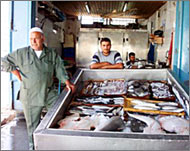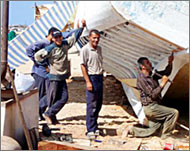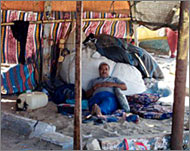Gaza’s fishing boats lie idle
The once bustling fishermen’s wharf in Gaza lies dormant, with hundreds of redundant vessels tied along the shore.

Nearby dozens of fishermen sit under makeshift canopies, sheltering from the sun.
The fishermen’s cafeteria is full of the fishless unemployed, who spend the day playing cards. The outlook is bleak for this historic city by the sea.
Key industry
The fisheries sector in Gaza makes up about 7% of the area’s total agricultural output and supports more than 55,000 people, including 3000 fishermen.
But as the Israeli occupation continues, the future of the sector and the fate of thousands of Palestinian fishermen hang in the balance.
According to Tariq Saqr, head of the Directorate General of Fisheries, the fishing industry has suffered nearly $11 million in losses since the start of the second Intifada in 2000.
“The situation is very bad. There are hardly any fish, and no one is buying what’s available,” said Musa Usruf, a salesman in Gaza’s once bustling fish market, now all but abandoned.
Fishing is an inherited trade in Gaza. Fishermen grow up learning nothing else, and possessing few other skills.
As a result, the number of fishermen continues to grow, as the size of the fishing zone permitted them by the Israelis gets ever smaller.
Shrinking waters
The Oslo Accord, signed by the PLO and the Israeli Government in 1993, gave Palestinian fishermen the right to work in a zone of 37km (23 miles) along the Gaza Strip coastline. However, fishermen have rarely been allowed to exceed 19km (12 miles).
 |
|
Gaza’s abandoned fish market |
Since the beginning of the second Intifada, it has been reduced still further. The southern fishing zone of the Gaza Strip has been inaccessible for months due to Israeli closures.
The original 45km (28 miles) of coastal fishing zone has now been effectively reduced to 10km (six miles), the distance between Deir al-Balah and the Shati’ refugee camp.
Given the constant contraction of fishing zone limits, it has become increasingly difficult for the fishermen to keep track and to determine whether they are in permitted waters.
“We are not allowed to carry any fancy navigational equipment, but we usually get it right anyway. It’s instinctual for us. If we do get it wrong, it’s only within a margin of 500 metres or so,” said Atif Bakr, president of the fisherman’s union.
Imprisoned
The fishermen cannot afford to make mistakes. Israeli military boats, known locally as Dabur, monitor the coast and are ruthless in their response.
The Dabur have shot indiscriminately at the fishermen, thrown boiling water on them and forced them to undress and jump into the sea. Such treatment violates the Fourth Geneva Convention, which enshrines the rights of non-combatants in wartime.
The Israelis have also been known to destroy docked fishing vessels with missiles and confiscate fishermen’s boats and equipment.
Fishing licences are regularly confiscated and fishermen themselves are sent to prison in Ashdod and made to pay a hefty fine for violating limits.
Umar Bakr, a fisherman of 20 years, was shot in March by Israel gunboats, even though he was within the fishing zone’s limits.
 |
|
Fixing boats damaged by the Israeli Dabur |
“It got to the point where I said ‘why not just shoot me in the head and get it over with’,” he said.
His brother, also a fisherman, was imprisoned by the Israelis several months ago, and he is still trying to bail him out. Umar has only made $11 in the past six months.
Piracy
Over 100 fishing vessels have been completely destroyed by Israeli gunships, including that of Salah Abu Riyal, whose vessel was blown up by a missile a few weeks ago. He has not been offered any reparations or explanations.
Atif Bakr has tried several times to take reporters out with him, including Aljazeera, to film the tribulations of the fishermen. “Every time, we pay the price,” he told Aljazeera.net.
His entire crew has been imprisoned and made to pay a fine of about $900.
“They do what they want, there are no laws governing them,” chimed in Khalil Hamdi, another fisherman.
“There is no one out there but us and them. There are no settlements or borders. So everyone and everything is fair game.”
Seasonal persecution
The fishermen denied that the Gaza Strip, the only Palestinian outlet to the sea, is a smuggling entry for weapons and drugs.
“We have none of this going on… no smuggling… no security issues… so why have they waged war against us?” asked Atif Bakr rhetorically. “They want to destroy us economically,” he continued, answering his own question.
 |
|
Lost livelihood: a fisherman waits for his luck to change |
“They only seem to want to bother us when it’s fishing season,” noted Hasan Ghandur, a fish merchant.
In the heyday of the Gaza fishing industry, the coastal fishing zone extended all the way to Egypt’s Port Said, and fish were regularly exported to both Israel and Jordan. Restaurants boasted the origin of their fish – Gaza – because of its reputation for high quality.
The Oslo accords severely restricted Palestinian trade, virtually limiting the market for fish to Israel and Gaza. No fish trade is permitted from Gaza to the West Bank or Jordan, though demand continues to exist there.
Since 2000, all exports, even those to Israel, have ceased. Donor countries have put most of their funding for the fishery sector on hold, and have all but deserted the Gaza Strip.
“Our organisation used to have a $3 million budget. Now that’s been converted to debt owed to us by the fishermen,” said Muhammad Zakut, director of the al-Tawtiq Co-operative Society of Fisherman.
Spoiled fish
Fishing output is now at 10% of its normal rate. Before the Intifada, Palestinian fish were regularly exported to Israel via the Karni crossing. Even then, Israelis made life difficult, leaving fish on the crossing for long periods of time for inspection.
“We check on fish leaving from here very carefully, but they check it again, wait until their veterinary doctor arrives, and by that time half the fish have spoiled,” said Tariq Saqr.
“Then they end up only take certain things, and we have to obey. But with their fish – we’re forced to take what they bring. This isn’t fair”
“No one asks what’s happening in the sea,” said Zakut. “The fishing industry has been affected more than workers who travel to Israel. A worker loses his salary. A fisherman loses his entire livelihood.”